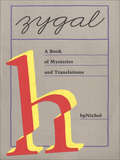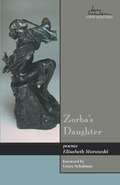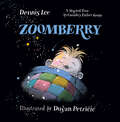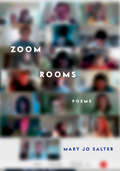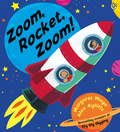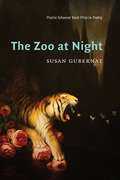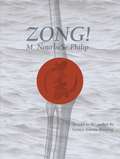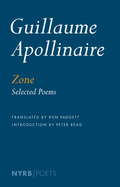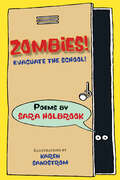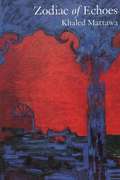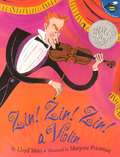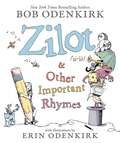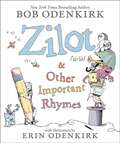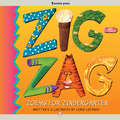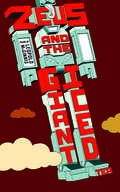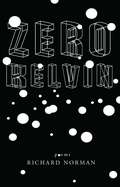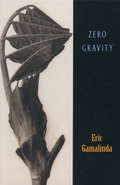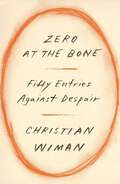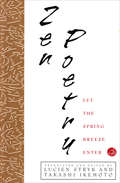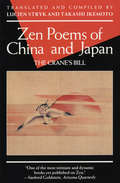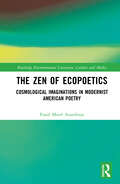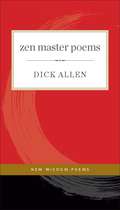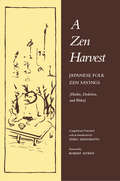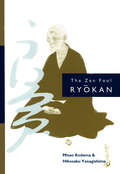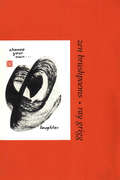- Table View
- List View
Zygal: A Book of Mysteries and Translations
by Bp NicholOriginally twelve years in the making! Featuring a cast of thousands. It still stars the letter H, and introduces Probable Systems, Negatives, and the Actual Life of Language! Your heart will pound as you see H's turn into I's before your very own eyes. You'll thrill as words fall apart only to create other words. You'll gasp as bpNichol collaborates with the dead. You'll shake your head in disbelief as he walks the line between fact and fiction one step beyond into the twilight zone of 'pataphysics.
Zorba's Daughter: poems (Swenson Poetry Award #14)
by Elisabeth MurawskiIn Zorba's Daughter, the 14th volume in the Swenson Poetry Award series, Elisabeth Murawski speaks from a vital and unique sensibility, finding in ordinary images an opening to the passion of human courage in the face of deep existential pain and ambivalence. These poems awaken our joy as well as guilt, our hope as well as grief. They often evoke a sorrowful music, like the voice of mourning, but even in pointing to "the black holes of heaven," Murawski turns our gaze upward. Zorba's Daughter was selected for the Swenson Award by the distinguished poet Grace Schulman. An icon of the literary scene, Schulman is acclaimed for her searching, highly original, lyric poetry, as well as for her teaching and her influential tenure as the poetry editor at The Nation, (1971-2006). Harold Bloom calls her "one of the permanent poets of her generation." Richard Howard says, "she is a torch."
Zoomberry: Fixed Format Layout
by Dennis LeeZoomberry, zoomberry, zoomberry pie:Zoomberry, zoomberry, now I can fly.Who hasn’t dreamed of flying? In this enchanting bedtime poem by Canada’s Father Goose, a crotchety wizard shares his secret spell for taking flight. Based on Dennis Lee's “The Wizard,” from his acclaimed collection Melvis and Elvis, and gorgeously illustrated by award-winning illustrator Dusan Petricic, Zoomberry is a magical adventure for the very young that will send readers soaring through nighttime skies."
Zoom Rooms: Poems
by Mary Jo SalterThe timeless and timely intersect in poems about our unique historical moment, from the prizewinning poet.In Zoom Rooms, Mary Jo Salter considers the strangeness of our recent existence, together with the enduring constants in our lives. The title poem, a series of sonnet-sized Zoom meetings—a classroom, a memorial service, an encounter with a new baby in the family—finds humor and pathos in our age of social distancing and technology-induced proximity. Salter shows too how imagination collapses time and space: in &“Island Diaries,&” the pragmatist Robinson Crusoe meets on the beach a shipwrecked dreamer from an earlier century, Shakespeare&’s Prospero. Poems that meditate on objects—a silk blouse, a hot water bottle—address the human need to heal and console. Our paradoxically solitary but communal experiences find expression, too, in poems about art, from a Walker Evans photograph to a gilded Giotto altarpiece. In these beautiful new poems, Salter directs us to moments we may otherwise miss, reminding us that alertness is itself a form of gratitude.
Zoom, Rocket, Zoom! (Awesome Engines #5)
by Margaret MayoCome on a fantastic adventure to the moon and deep into space! This exciting book is full of amazing astronauts and super space vehicles. Discover a different vehicle on each page, from rockets and moon buggies, to robot rovers, satellites and more.With bright, bold illustrations and fun, rhyming text, this is perfect for sharing and reading aloud. Little ones will love spotting all the details on each page and joining in with the lively text; as rockets 'zoom' and satellites 'whizz!'From the creators of the bestselling Dig Dig Digging.
The Zoo at Night (Prairie Schooner Book Prize in Poetry)
by Susan GubernatWinner of the Prairie Schooner Book Prize in Poetry, Susan Gubernat’s The Zoo at Night reflects with subtle craft on the dark side of love, death, the family romance, carnality, and lofty aspirations. She thinks of her poems as “night thoughts” resembling nocturnes, in which “a bit of light leaks in.” Both experimental and classic, Gubernat’s poems combine formal and free verse elements. A (mostly) unrhymed sonnet sequence seeks to recall the world of a pre-digital childhood when physical objects—tactile, mechanical—took on totemic import and magical significance. Other poems echo the Rilkean principle that poetry can be empathetic by looking outward at the “thingness” of the world. In these works of love and longing, Gubernat enters through the doors of craft and exits with feeling.
Zong!: As Told To The Author By Setaey Adamu Boateng (Wesleyan Poetry Series)
by M. NourbeSe Philip Setaey Adamu BoatengIn November, 1781, the captain of the slave ship Zong ordered that some 150 Africans be murdered by drowning so that the ship’s owners could collect insurance monies. <P><P>Relying entirely on the words of the legal decision Gregson v. Gilbert—the only extant public document related to the massacre of these African slaves—Zong! tells the story that cannot be told yet must be told. Equal parts song, moan, shout, oath, ululation, curse, and chant, Zong! excavates the legal text. <P><P>Memory, history, and law collide and metamorphose into the poetics of the fragment. Through the innovative use of fugal and counterpointed repetition, Zong! becomes an anti-narrative lament that stretches the boundaries of the poetic form, haunting the spaces of forgetting and mourning the forgotten. <<P><P>Check for the online reader’s companion at http://zong.site.wesleyan.edu. <P><P><i>Advisory: Bookshare has learned that this book offers only partial accessibility. We have kept it in the collection because it is useful for some of our members. Benetech is actively working on projects to improve accessibility issues such as these.</i>
Zone
by Peter Read Ron Padgett Guillaume ApollinaireZone is the fruit of poet-translator Ron Padgett's fifty-year engagement with the work of France's greatest modern poet. This bilingual edition of Apollinaire's poetry represents the full range of his achievement from traditional lyric verse to the pathbreaking visual poems he called calligrams, from often-anthologized classics to hitherto-untranslated gems, from poems of cosmic breadth to a poem about his shoes. Including an introduction by the distinguished scholar Peter Read, helpful endnotes, a preface, and an annotated bibliography by Padgett, this new edition of Apollinaire stands out not only for its compact and judicious selection of the essential poems but also as the work of an important American poet.
Zombies! Evacuate the School!
by Sara Holbrook Karen SandstromA fun and quirky collection of school poems every kid will relate to. Celebrated performance poet Sara Holbrook's poems range from begging for a few more minutes' sleep to a "slam-dancing ride" on the big yellow bus, from the teacher who picks up signals with "antennae in her hair" to a full-on zombie invasion. Silly, serious, and everything in between, these poems show kids that poetry is not just for grown-ups! Writing prompts and mini poetry lessons throughout introduce readers to many of the elements of poetry and invite kids to write poems of their own.
Zodiac of Echoes: Poems
by Khaled MattawaHis first book, was enthusiastically received. Mattawa received the prestigious Hodder Fellowship at Princeton University.
Zin! Zin! Zin! A Violin
by Lloyd MossUsing evocative poetic language, the author describes ten instruments coming on stage and performing, to the delight of the audience. [This text is listed as an example that meets Common Core Standards in English language arts for K-1 at http://www.corestandards.org.]
Zilot & Other Important Rhymes
by Bob OdenkirkEmmy Award-winning and New York Times bestselling writer, comedian, and actor Bob Odenkirk and his daughter, illustrator Erin Odenkirk, present poetic nonsense for all ages perfect for fans of Shel Silverstein and Jack Prelutsky! Bob Odenkirk began writing these poems with his children when they were little, compiling the poetry into a homemade book entitled Olde Time Rhymes. He wanted Nate and Erin to understand that actual people had written the books the family loved to read and to instill in them the feeling that they could be writers and illustrators themselves. Almost twenty years later, when the Odenkirks found themselves quarantined under the same roof, they revisited these mostly silly, sometimes poignant works. It wasn't until Erin began to create illustrations to accompany the words, though, that the book grew to be something much bigger than an Odenkirk family treasure. From the titular made-up word for a blanket fort, an adorable dog with a penchant for the zoomies, and a father teaching his kids how umbrellas work, the subjects of these works, complemented by Erin&’s whimsical and detailed linework, come alive on these pages. Featuring over seventy poems, Zilot & Other Important Rhymes will delight readers young and old.
Zilot and Other Important Rhymes
by Bob Odenkirk Erin Odenkirk Nate Odenkirk Naomi OdenkirkEmmy Award-winning and New York Times bestselling writer, comedian, and actor Bob Odenkirk and his daughter, illustrator Erin Odenkirk, present poetic nonsense for all ages perfect for fans of Shel Silverstein and Jack Prelutsky! <p><p>Bob Odenkirk began writing these poems with his children when they were little, compiling the poetry into a homemade book entitled Olde Time Rhymes. He wanted Nate and Erin to understand that actual people had written the books the family loved to read and to instill in them the feeling that they could be writers and illustrators themselves. Almost twenty years later, when the Odenkirks found themselves quarantined under the same roof, they revisited these mostly silly, sometimes poignant works. It wasn't until Erin began to create illustrations to accompany the words, though, that the book grew to be something much bigger than an Odenkirk family treasure. <p><p>From the titular made-up word for a blanket fort, an adorable dog with a penchant for the zoomies, and a father teaching his kids how umbrellas work, the subjects of these works, complemented by Erin’s whimsical and detailed linework, come alive on these pages. Featuring over seventy poems, Zilot & Other Important Rhymes will delight readers young and old.
Zigzag
by Loris LesynskiAfter hundreds of school visits, Loris knows that kindergarten kids have their own kind of wit. Too old for nursery rhymes and too young for irony, kindergarteners crave a playfulness that Zigzag zupplies by the zillions! Bursting with zaniness, these poems focus on the pleasure of sound and the rhythm of language, and each contains an inherent invitation to join in.
Zeus and the Giant Iced Tea
by Leopold McginnisCrafting wings out of wax and poems from the underground, Zeus and the Giant Iced Tea is a dreamlike voyage through poetic narrative format, blurring the line between poetry and fiction. Exploring the frenetic lives of Mexican cowboys, robots, sultans, Greek gods, and convenience store clerks, Zeus and the Giant Iced Tea shatters preconceived notions of poetry and instead offers a more accessible strain of literary free flow.
Zero Kelvin
by Richard NormanPresent-day astronomy, vast, complex, is looking through darkness to distant objects and times. Yet its discoveries aren't exclusively scientific: from the moons of Pluto to the Doppler effect, the night sky screens a place where math meets myth. Now, in Zero Kelvin, in scenes that shift from the mountains of Goma to the mountains of the moon, from galaxies that feast upon their neighbours to a solar sail unfurling above Earth's orbit, Richard Norman's poetry probes both newly glimpsed corners of the universe, and the myths which bring them into focus. Experiment. It is a human urge-to orbit backwards at great speed.Experimentally, you do itand then the crack of lightning, the open-ended snowflake, splits the sky. Just as the sculptor cut the fat off space,you going backwards renders time. Seconds drop like filings when a magnet is turned off.
Zero at the Bone: Fifty Entries Against Despair
by Christian WimanChristian Wiman braids poetry, memoir, and criticism to create an inspired, career-defining work. Few contemporary writers ask the questions about faith, morality, and God that Christian Wiman does, and even fewer—perhaps none—do so with his urgency and eloquence. Wiman, an award-winning poet and the author of My Bright Abyss, lays the motion of his mind on the page in this genre-defying work, an indivisible blend of poetry, criticism, theology, and searing memoir. As Marilynne Robinson wrote, “[Wiman's] poetry and his scholarship have a purifying urgency that is rare in this world . . . It enables him to say new things in timeless language, so that the reader’s surprise and assent are one and the same.”Zero at the Bone begins with Wiman’s preoccupation with despair, and through fifty brief pieces, he unravels its seductive appeal. The book is studded with the poetry and prose of writers who inhabit Wiman’s thoughts, and the voices of Wallace Stevens, Lucille Clifton, Emily Dickinson, and others join his own. At its heart and Wiman’s, however, are his family—his young children (who ask their own invaluable questions, like “Why are you a poet? I mean why?”), his wife, and those he grew up with in West Texas. Wiman is the rare thinker who takes up the mantle of our greatest mystics and does so with an honest, profound, and contemporary sensibility. Zero at the Bone is a revelation.
Zen Poetry: Let the Spring Breeze Enter
by Lucien Stryk Takashi IkemotoFrom the editors of Zen Poems of China and Japan comes the largest and most comprehensive collection of its kind to appear in English. This collaboration between a Japanese scholar and an American poet has rendered translations both precise and sublime, and their selections, which span fifteen hundred years—from the early T’ang dynasty to the present day—include many poems that have never before been translated into English. Stryk and Ikemoto offer us Zen poetry in all its diversity: Chinese poems of enlightenment and death, poems of the Japanese masters, many haiku—the quintessential Zen art—and an impressive selection of poems by Shinkichi Takahashi, Japan’s greatest contemporary Zen poet. With Zen Poetry, Lucien Stryk and Takashi Ikemoto have graced us with a compellingly beautiful collection, which in their translations is pure literary pleasure, illuminating the world vision to which these poems give permanent expression.
Zen Poems of China and Japan: The Crane's Bill
by Lucien Stryk“Excellent . . . A fine introduction to Chinese and Japanese Zen poetry for all readers” from the editors of Zen Poetry: Let the Spring Breeze Enter (Choice). Capturing in verse the ageless spirit of Zen, these 150 poems reflect the insight of famed masters from the ninth century to the nineteenth. The translators, in collaboration with Zen Master Taigan Takayama, have furnished illuminating commentary on the poems and arranged them as to facilitate comparison between the Chinese and Japanese Zen traditions. The poems themselves, rendered in clear and powerful English, offer a unique approach to Zen Buddhism, “compared with which,” as Lucien Stryk writes, “the many disquisitions on its meaning are as dust to living earth. We see in these poems, as in all important religious art, East or West, revelations of spiritual truths touched by a kind of divinity.” “One of the most intimate and dynamic books yet published on Zen.” —Sanford Goldstein, Arizona Quarterly
The Zen of Ecopoetics: Cosmological Imaginations in Modernist American Poetry (Routledge Environmental Literature, Culture and Media)
by Enaiê Mairê AzambujaThis book is the first comprehensive study investigating the cultural affinities and resonances of Zen in early twentieth-century American poetry and its contribution to current definitions of ecopoetics, focusing on four key poets: William Carlos Williams, Marianne Moore, Wallace Stevens, and E.E. Cummings. Bringing together a range of texts and perspectives and using an interdisciplinary approach that draws on Eastern and Western philosophies, including Zen and Taoism, posthumanism and new materialism, this book adds to and extends the field of ecocriticism into new debates. Its broad approach, informed by literary studies, ecocriticism, and religious studies, proposes the expansion of ecopoetics to include the relationship between poetic materiality and spirituality. It develops ‘cosmopoetics’ as a new literary-theoretical concept of the poetic imagination as a contemplative means to achieving a deeper understanding of the human interdependence with the non-human. Addressing the critical gap between materialism and spirituality in modernist American poetry, The Zen of Ecopoetics promotes new forms of awareness and understanding about our relationship with non-human beings and environments. It will be of interest to scholars, researchers, and students in ecocriticism, literary theory, poetry, and religious studies.
Zen Master Poems
by Dick AllenA unique voice in American poetry evocative of Han Shan's Zen verses, Pablo Neruda's Book of Questions, and the writings of Jack Kerouac.What a long conversation we never had! All those rivers? we never crossed together. You so busy with your own life, I so busy with mine. Dick Allen, one of the founders of the Expansive Poetry movement, has won the Robert Frost Prize, the Hart Crane Poetry Prize, and the Pushcart Prize--among others. His work has been anthologized five times in the Best American Poetry volumes, and has appeared in The New Yorker, The Atlantic Monthly, Tricycle, The Buddhist Poetry Review, and The American Poetry Review, as well as numerous other publications. He's a former fellow of the National Endowment for the Arts, and a former Poet Laureate for the state of Connecticut, where he lives and writes.
A Zen Harvest
by Soiku ShigematsuOne of the vital aspects of traditional Rinzai Zen koan study in Japan is jakugo, or capping-phrase exercises. When Zen students have attained sufficient mastery of meditation or concentration, they are given a koan (such as the familiar "What is the sound of one hand clapping?") to study. When the student provides a satisfactory response to the koan, he advances to the jakugo exercise-he must select a "capping phrase," usually a passage from a poem among the thousands in a special anthology, the only book allowed in the monastery. One such anthology, written entirely in Chinese, was translated by noted Zen priest and scholar Soiku Shigematsu as A Zen Forest: Sayings of the Masters. Equally important is a Japanese collection, the Zenrin Segoshu, which Mr. Shigematsu now translates from the Japanese, including nearly eight hundred poems in sparkling English versions that retain the Zen implications of the verse.
The Zen Fool Ryokan
by Misao Kodama Hikosaku YanagashimaRyokan's poems are celebration of the joys and sadnesses of everyday life. His spare, direct style is remarkable for its immediacy and intimacy. This bilingual collection contains more than 150 of his finest poems in Japanese and Chinese, including his famous lyrical correspondence with the nun Teishin, who befriended him in his later years. It also includes a biographical essay on Ryokan, and useful notes on the poems themselves.
Zen Brushpoems
by Ray GriggZen Brushpoems connects the creative insights of Haiku-like poetry with the dynamic interplay of the written word and painted image. This subtle and profound medium of poetic expression has been inspired by the revolutionary work of Paul Reps
